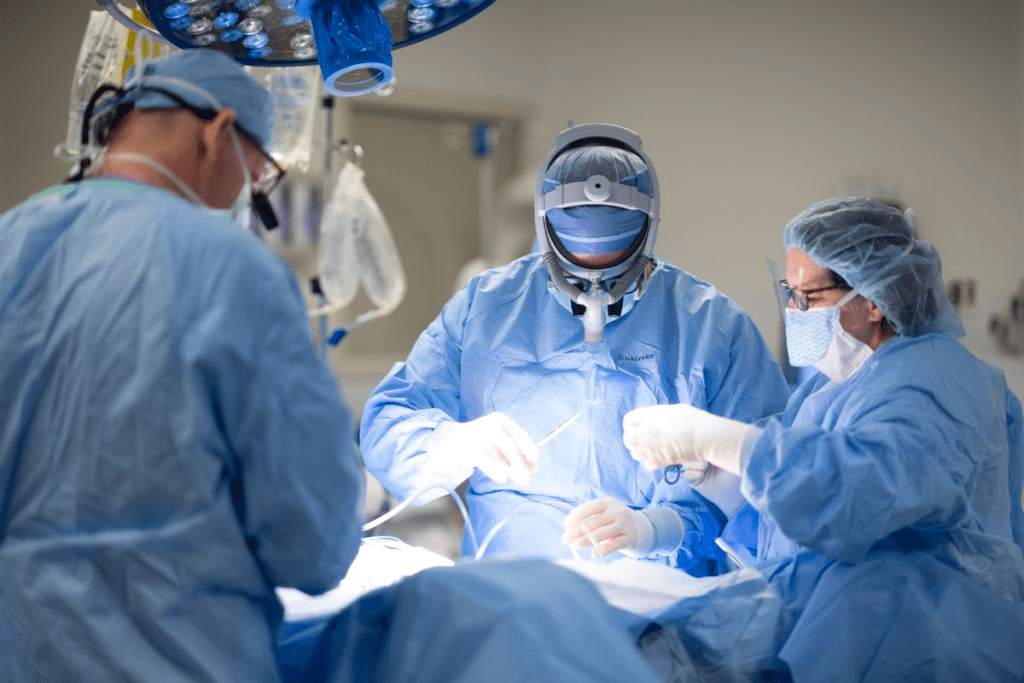Last Updated on October 21, 2025 by mcelik

Pediatric surgeons are very skilled doctors. They focus on surgery on infants, children, and adolescents. They are key in treating many conditions that need surgery.
To become a pediatric surgeon, one needs a lot of training. This includes 4 years of medical school, 5 years of adult general surgery training, and 2 additional years of fellowship training in pediatric surgery. This training helps them handle complex cases.
Even though pediatric surgeons are very skilled, they don’t do every surgery. Their focus on young patients is very important.

Pediatric surgery is a unique field. Surgeons here need to understand the special needs of young patients. They handle surgeries for kids, like fixing birth defects and treating tumours, stomach problems.
Pediatric surgeons work with kids from birth to their teens. They are experts in treating birth defects and spotting problems before a baby is born. Their job includes surgery and caring for kids before and after surgery.
Pediatric surgeons treat many conditions. They fix birth defects early in life. Their training lets them meet the special needs of kids, making them key in healthcare.
Children’s surgery needs change with age. Neonatal surgery is for newborns, often for birth defects. Older kids might need surgery for injuries or problems like appendicitis.
Pediatric surgeons must think about the differences between kids and adults in surgery. They need to know how kids grow and how it affects surgery results.
Pediatric surgeons focus on the special needs of kids. They play a key role in healthcare, giving top-notch care to children from birth to teens.

Children’s surgeries cover a wide range. Pediatric surgeons handle everything from neonatal surgery to appendectomies. They are trained for many cases, from fixing birth defects to removing tumors.
Congenital anomalies happen during fetal development. Pediatric surgeons fix these issues through surgery. Examples include:
A study in the Journal of Pediatric Surgery shows early surgery improves outcomes. Early diagnosis and treatment are key to managing these conditions well.
Pediatric surgeons also remove tumours in kids. Tumours can be in the abdomen, chest, or soft tissues. The goal is to remove the tumour fully while keeping healthy tissue safe.
Some common tumours in kids are:
A pediatric oncologist says, “Removing tumours is often the first step. Then, chemotherapy and radiation may follow.”
“The teamwork between pediatric surgeons, oncologists, and other specialists is vital for treating pediatric tumors well.”
Pediatric surgeons do many surgeries, like appendectomies and hernia repairs. These are for acute or chronic issues.
In children’s hospitals, surgeons work with a team for full care. Minimally invasive techniques are getting more use, cutting down recovery time and scars.
Pediatric surgery covers a wide range of conditions in kids, from congenital anomalies to pediatric tumors. But there are limits to what they can do.
Knowing these limits helps us understand the complexity of caring for kids. It also shows why a team approach is so important.
Pediatric surgeons focus on kids’ health. They don’t handle adult-specific surgical procedures. This means surgeries common in adults, like some cancer surgeries or vascular procedures, are for adult surgeons.
For example, coronary artery bypass grafting or surgeries for adult conditions are not part of pediatric surgery.
Pediatric surgeons are skilled in many areas. But some highly specialized interventions need more training. These include some neurosurgical and cardiac surgeries that need pediatric subspecialists.
Pediatric surgeons work with a team. When a child needs specialized care beyond their expertise, they refer to other specialists. This team effort ensures kids get the best care for their needs.
For instance, a child needing orthopedic surgery might see an orthopedic surgeon who specializes in kids. Urological issues might be handled by a pediatric urologist.
In summary, pediatric surgeons are key in managing kids’ surgeries. But, they have their limits. Knowing when to call in other specialists is vital for complete care.
Medical science is advancing fast, leading to more demand for pediatric surgeons with specialized skills. This is because children need precise and effective treatments for complex conditions.
Pediatric surgery covers many subspecialties, each focusing on different needs. Some key areas include:
Some subspecialties are in high demand because of their critical nature and complex cases. For example, pediatric cardiac surgery is very specialized. It requires precise skills to fix congenital heart defects in children.
Pediatric gynecologic surgery is also becoming more important. It deals with the unique reproductive health needs of adolescent girls.
While some areas are in high demand, others are less crowded but just as vital. These include pediatric anesthesiology, orthopedic surgery for children, and urology. These fields need specialized training and are key to the full care of pediatric patients.
Fellowship training programs are vital for preparing pediatric surgeons in their chosen subspecialty. Recent statistics show a steady rise in pediatric surgeons pursuing fellowship training. There’s a notable interest in pediatric surgery training programs.
The data suggests that the number of pediatric surgeons will grow faster than the pediatric population by 2030. This is a positive sign for the availability of specialized surgical care for children.
Pediatric surgeons go through a lot of training to give top-notch care. This training covers both learning and doing.
To become a pediatric surgeon, one starts with a solid education. This means 4 years of medical school to get a Doctor of Medicine (M.D.) or Doctor of Osteopathic Medicine (D.O.) degree. Then, they do 5 years of adult general surgery training in a residency program. This is the key learning of surgical skills.
After the general surgery residency, they need to do a 2-year fellowship in pediatric surgery. This advanced training focuses on surgery for kids, from babies to teens.
Fellowship training in pediatric surgery gives surgeons the skills for complex child cases. It includes clinical experience and research, making sure they can give the best care.
In their fellowship, surgeons work with experienced pediatric surgeons. They learn to diagnose and treat many surgical conditions in kids. This is a critical time for developing the skills needed for a career in pediatric surgery.
After a fellowship, pediatric surgeons get board certification from the American Board of Surgery (ABS) or their country’s certifying body. They pass a tough exam to show their knowledge and skills in pediatric surgery.
To keep their certification, they must do continuing education courses. This keeps them up-to-date with the latest in pediatric surgical care. It helps them give the best care to their patients.
This thorough training and certification show pediatric surgeons’ dedication to caring for children. The high standards mean they’re ready for the unique challenges of pediatric surgery.
Managing complex pediatric cases requires a team effort. Pediatric surgeons team up with other healthcare experts. This ensures complete care for their young patients.
Some pediatric cases are too complex for just surgery. They need a multidisciplinary team to handle all aspects of care. This team includes surgeons, anesthesiologists, radiologists, and more. They work together to create a treatment plan.
A team in pediatric care has many healthcare professionals. This team makes sure every part of a child’s condition is considered. They work together to plan the best treatment.
Each team member brings their special skills. This ensures the child gets all-around care.
Working with pediatric subspecialists is key for complex cases. Pediatric surgeons team up with these experts. They make sure every part of the child’s condition is covered.
For example, in pediatric tumours, surgeons and oncologists plan the treatment. This includes surgery, chemotherapy or radiation.
Many specialists work together on complex cases. For instance, in congenital heart defects, cardiac surgeons, cardiologists, and intensivists team up.
Another example is in complex abdominal conditions. Pediatric surgeons, gastroenterologists, and radiologists work together. This ensures complete care for the child.
These team efforts lead to better care for children. It improves their outcomes and quality of life.
Pediatric surgeons are key in giving specialized care to kids. They focus on the unique needs of young patients. Knowing what pediatric surgery covers is key to top-notch care for children.
Pediatric surgeons get special training and must pass tests to prove their skills. They can handle many surgeries, like fixing birth defects or removing tumours. But, they only do surgeries that are right for kids.
Helping kids often means working with a team. Pediatric surgeons team up with other experts for a full treatment plan. This teamwork ensures kids get the best care possible.
The role of pediatric surgery is huge, and it keeps getting better. As discoveries are made, kids will have even better surgery outcomes. It’s vital to see how important pediatric surgeons are in caring for children.
A pediatric surgeon is a doctor who specializes in surgeries for kids. They work with newborns to teenagers. They are trained to handle many surgical conditions specific to this age group.
Pediatric surgeons do many surgeries. They fix congenital anomalies and remove tumours. They also do surgeries on the stomach and intestines, and other minor procedures.
No, pediatric surgeons don’t do surgeries on adults. Their training is for kids, and adults go to general surgeons or other specialists.
Neonatal surgery is for newborns. It’s to fix birth defects or other urgent conditions. Pediatric surgeons are trained for these complex procedures.
Minor surgeries include circumcisions and hernia repairs. These are common and relatively simple operations for kids.
Pediatric surgeons work with a team. They team up with other doctors like anesthesiologists and cardiologists. This team approach helps give kids with complex conditions the best care.
Pediatric surgeons train hard. They do 5-7 years of general surgery residency. Then, they do 2 years of fellowship in pediatric surgery. They also need to get board-certified.
Yes, there are many subspecialties. These include pediatric cardiothoracic surgery and pediatric neurosurgery. Some surgeons do extra fellowship training in these areas.
Pediatric surgeons keep learning. They go to conferences and join professional groups. This helps them stay updated with new techniques and best practices
Subscribe to our e-newsletter to stay informed about the latest innovations in the world of health and exclusive offers!